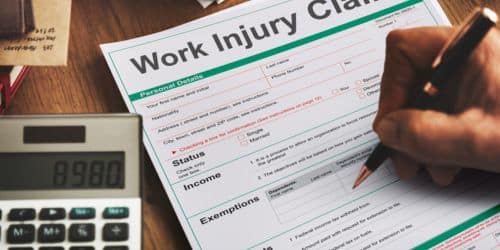If you work in specific industries, workers’ compensation, sometimes known as “workers’ comp,” is an important part of your benefits package. It guarantees that your company will assist in covering your medical bills and lost wages if you become ill or injured on the job. Learning how it works can improve your chances of getting the compensation you need. In this article, I explained everything about workers’ compensation requirements in Virginia. I also added some tips on how to get the best workers’ compensation lawyers in Virginia. Let’s dive in now!
What Is Workers Compensation in Virginia?
Most states require businesses to obtain workers’ compensation insurance, which provides coverage for workers who suffer illnesses or injuries at work. State-specific regulations differ, but they all attempt to offer assistance when a person’s job has an adverse effect on their health. When a person is unable to work due to a condition, workers’ compensation can help cover the cost of medical bills, treatment, and missed income.
What Does Workers Compensation in Virginia Cover?
When an employee or a covered subcontractor is hurt while working for your company, Virginia workers’ compensation insurance helps cover claim fees. It also protects your company from additional legal obligations connected to an injured employee. Workers Compensation protection consists of:
#1. Medical Expenses
Medical costs incurred as a result of claims or injured workers are covered by workers’ compensation insurance. Some of the expenses that are covered by insurance include the cost of an emergency room visit, necessary surgeries, and medication prescriptions. For instance, if a worker were hurt because of a slip and fall, they would be compensated. Longer-term costs like physical therapy or rehabilitation may also be covered under medical benefits.
#2. Pay and Benefits for Employees
Most business owners are unable to pay workers who are wounded and unable to work while they recover. If an employee has an injury or sickness that prevents them from working, workers’ compensation income benefits in Virginia will provide for their financial needs. For instance, the coverage would send payments to the employee to assist in restoring the lost wages if a construction worker fractured his arm and was unable to perform the job for 8 weeks.
#3. Short-Term and Long-Term Disabilities
An injury may occasionally result in a temporary impairment or a more severe impairment. The workers’ compensation program steps in to assist with the cost of ongoing medical expenses and might even make up some of the lost wages as a result of the disability. If a worker’s finger was severed as a result of harm sustained at work. The employee can receive compensation (referred to as an Impairment Rating) for the permanent handicap caused by the loss of the finger along with some interim disability benefits while recovering.
Unexpected occupational exposures can occur in certain types of work situations. Employee exposure to chemical irritants and adverse responses that render them ill, for instance, may occur during a chemical mixing procedure. The cost of medical care for a condition contracted while working would be covered by workers’ compensation coverage.
#5. Funeral costs
Each year, there are around 50,000 workplace fatalities. These are widespread in the trucking and construction sectors. A workers’ compensation policy is made to pay for these funerals and give the employee’s family death benefits. Frequently, state regulations dictate the dollar amount of coverage.
Workers’ compensation insurance is a No-Fault scheme created to stop expensive employee lawsuits resulting from accidents at work. Many state statutes have Exclusive Remedy clauses that shield covered enterprises from these claims in return for supplying their employees with workers’ compensation insurance. Within 30 days, claims must be reported to a supervisor. Also, employers must notify their insurance provider of any claims or mishaps within 30 days of becoming aware of them.
Workers Compensation Virginia Requirements
There are some Virginia Workers’ Compensation requirements you need to put in place before you can get insured. Businesses must get workers’ compensation insurance if they have three or more full-time or part-time employees. If workers’ compensation in Virginia is not acquired, businesses with fewer than three employees may still be responsible for the cost of a claim.
Also, partners and sole proprietors are automatically not protected, although they may choose to be. All officers of the company are automatically covered; however, they can opt out of accident insurance if they so desire. The Insurance Commission and the carrier must receive a Notice of Rejection form. Officers who are not paid are not regarded as workers.
Since members of an LLC are considered owners rather than employees, they are not immediately covered by workers’ compensation. On the Acord 130 form, they can choose their level of coverage. Managers of limited liability companies (LLCs) are given the same legal status as officers.
Who Qualifies for Workers’ Compensation in Virginia?
Not all employers are required to provide workers’ compensation insurance, even though all states have some sort of program. The cost of insurance is covered by the employer. Workers’ compensation benefits are not guaranteed to all workers and may be unavailable in some states. These workers could be:
- Independent companies
- Seasonal employees
- Farmers and farmhands
- Volunteers
- railroad personnel
- Businesses with fewer than a varying state-defined threshold of employees
There are some circumstances that workers’ compensation may not cover, depending on state regulations, including:
- Non-work-related illnesses or injuries
- Injuries received on the way to and from work
- Unintentional harm
The majority of businesses have workers’ compensation information posted in the workplace. The employer or human resources can provide more information to employees. Contact your state for more information on requirements, and inquire with your employer directly to find out if you are eligible for workers’ compensation. Contact the state or local workers’ compensation office to find out the requirements for workers’ compensation in your state.
How Do I File a Workers’ Compensation Claim?
Workers’ compensation benefits are obtained by employees by way of the insurance company of their employer. If you experience a work-related illness or accident, most employers can help you navigate the claims process. However, certain states have complicated procedures. The following are the steps you can take to file a workers’ compensation claim:
#1. Inform the Company
Human resources or another appropriate department should be notified as quickly as possible if you suffer a work-related illness or injury so that an employee can complete an incident report. If there is an emergency, get treatment right away. Each state has a different deadline for filing a report and starting a claim. While some jurisdictions mandate that you notify your employers within three days of an occupational illness or injury, others allow up to a year. You can better grasp the procedure and meet any claim deadlines if you are familiar with the company’s processes and the requirements of your state.
#2. See a Doctor
Check with your employer to see if there is a list of pre-approved doctors and hospitals that must be seen in order to receive full coverage from your health insurance plan. The doctor may send a medical report straight to the employer’s insurance provider if they are aware that the condition is work-related. If it’s an emergency, get help right away. It is possible to pay for your medical expenses upfront and then receive reimbursement from the insurance company. It’s crucial to be ready to pay for your initial doctor’s visit, even if your employer’s insurance company may occasionally pay your healthcare provider directly.
#3. Submit a Claim
After seeking medical attention, you can start the claim procedure. You can anticipate receiving the relevant paperwork and information from your company. They might also advise you to speak with their workers’ compensation insurance provider. You will normally need to complete state-mandated forms and maybe disclose your medical history and treatment in order to do this. You can then receive compensation for your medical expenses and other perks after a processing period. For instance, you might be awarded two-thirds of your missed weekly salary. Additional paperwork could be needed to get long-term disability benefits.
If your employer thinks that your illness or injury was not a result of your work, they may contest your claim. States have different procedures for handling disputes. You might have to go before a panel or workers’ compensation organization that makes the final call. After your claim has been resolved, you are no longer eligible for future medical expense coverage.
#4. Go back to Work
An employee who becomes ill or becomes injured at work and needs time off to care for themselves can eventually return to their job or another role that is at least somewhat similar. You might be able to work part-time while still getting paid in part as you return to the workforce, depending on your doctor’s recommendation. Besides meeting employees’ needs after their return to work, employers should also make changes to workplace processes to reduce the likelihood of future injuries and illnesses.
Workers’ Compensation Insurance in Virginia
Each state has its own regulations that specify how employees must be insured and how they must be categorized for premium ratings. Many states have class codes and varied rules on who needs to get workers’ compensation insurance. You might need to purchase coverage for each state where your employees are located and working if you have employees who commute across state lines for work or if they work in many states annually. Most of the time, one policy can cover several states.
Private insurance providers approved by the state to offer coverage for Workers’ Compensation Insurance are available in Virginia. If your company can’t get insurance through a private insurer, you can turn to the Assigned Risk Pool or another State Insurance Fund. You can navigate your best selections with the assistance of our specialists. Your business and employees’ class codes, expected payroll, covered states, past policies, owner experience, and workers’ compensation claims history all play a role in determining your policy premium.
Read Also: Business Liability Insurance: Meaning, Types & Coverage
Workers’ Compensation Laws in Virginia
Businesses with two or more employees must hold workers’ compensation insurance, according to the Virginia Workers’ Compensation Act. Employees who get diseases or injuries at work might recover with the aid of this insurance.
In the Old Dominion state of Virginia, workers’ compensation is run by the Virginia Workers’ Compensation Commission (VWC). It is responsible for administering benefits, upholding the law, and settling disputes. The members of the commission are:
- Three commissioners
- Executive director
- Chief deputy commissioner
Private insurance companies in Virginia are able to provide workers’ compensation insurance to employers.
Your Obligations As An Injured Worker: File Virginia Workers’ Compensation Claim
As an injured worker, you are responsible for a variety of tasks. among the most crucial are;
- Your injury must be reported as quickly as possible to your employer (and statutory employer, if relevant).
- You must attend all of your doctor’s scheduled appointments and adhere to his or her recommended course of treatment.
- You are required to keep all appointments made by the workers’ compensation insurance provider for independent medical evaluations and second opinions.
- If your doctor places you on temporary partial disability with mild duty limits, you must completely cooperate with anyone who is assisting you in finding employment. Attending meetings with rehabilitation specialists and employers falls under this category. However, you are under no obligation to provide a rehabilitation professional access to your private financial information.
- If you have a job or see a rise in your income while receiving workers’ compensation payments, let your employer and insurance provider know.
- Attend depositions and respond to any interrogatories that an insurance company’s lawyer may send you.
- Attend each hearing as scheduled.
Workers Compensation Virginia Lawyers
Suppose you have been injured on the job and are having trouble getting the workers’ compensation benefits you need. In that case, if your injury is severe and will require extensive medical care, or if you have been rendered permanently disabled, you need a lawyer who can assist you in getting the compensation you deserve. Insurance claims being denied and medical bills being paid in full or in part are common problems for injured workers.
Workers may also have a hard time obtaining benefits for a permanent loss or handicap sustained on the job. So, consultation with a workers’ compensation lawyer is recommended if you have difficulty obtaining the benefits to which you are entitled under Virginia law.
Do You Need Workers Compensation Virginia Lawyers for Your Claim?
Many people who have injuries in the workplace are unsure if they need legal representation. Maybe you don’t think you need legal representation. However, having legal representation is your best bet for collecting your benefits.
When Should I Seek Virginia Workers’ Compensation Benefits?
Workers’ compensation claims are mandatory if an injury occurs on the job. If you’ve been hurt on the job, filing a claim can help you collect the money you need to recover. A worker injured in Virginia has two years from the date of the accident in which to file a claim for workers’ compensation. It’s important to remember that making a claim with the Commission is different from informing your employer and the insurance carrier about a workplace injury. The Workers’ Compensation Commission requires a claim for benefits to be submitted before a claim may be processed. To safeguard your workers’ compensation benefits, you must also submit a claim to the Workers’ Compensation Commission.
Your insurance claim may not be secure, even though the insurance company is paying you. The Commission has not yet entered an “Award Order” that permanently establishes your rights. In order to safeguard your workers’ compensation rights, you must submit a claim for benefits and be issued an award order.
By notifying the Commission that you have been injured and are seeking compensation, you have filed a “Claim for Benefits.” Your right to make a claim with the Commission may be lost forever if you wait longer than two years after your accident to do so. In order to obtain your workers’ compensation payments, you must file a claim with the Virginia Workers’ Compensation Commission.
The Insurance Company Wants Me to Sign a Release, is that a Good Idea?
Should the insurance company want a release from you, you should politely decline. You are not obligated to sign a release in favor of the insurance company under Virginia’s workers’ compensation legislation. Your doctor will actually charge your insurer directly once you’ve let him know who you work for. If you sign the insurance company’s release, they’ll have access to your medical records beginning with your birth. Your work injury has nothing to do with the fact that you had chicken pox when you were eight years old. Nothing. The release is unnecessary. Your non-work-related medical care and treatment history must be kept confidential.
What Information Do I Need to Give the Insurance Agency?
After reporting the accident details to the insurance company, you should keep your mouth shut. When calling your insurance company to report an accident, avoid giving a recorded statement. This step can be skipped if desired. In fact, step one is to explain what happened in detail to your employer. The next step is for your employer to notify their workers’ compensation insurance provider about the incident. The insurance adjuster is the person you will most likely speak to after an accident has occurred. However, the insurance company may want a recorded statement after you have initially spoken with them. Please don’t. You’ve informed your supervisor and the insurance company as much as you need to at this point.
You can get your benefits without giving a recorded statement to the insurance company. In order to collect benefits, the insurance adjuster will often insist that you provide a recorded statement. That is not the case. If you agree to a recorded statement, the insurance company will ask you pointed questions designed to discredit or derail your claim. Keep in mind that the goal of any insurance business is to maximize profits. They generate a profit by arbitrarily rejecting legitimate claims. Refrain from making a taped confession. Instead, seek the services of a lawyer who focuses on workers’ compensation in the state of Virginia.
Final Thoughts
You need to get workers’ compensation so as to save yourself from some issues that might arise. You might need to purchase coverage for each state where your employees are located and working if you have employees who commute across state lines for work or if they work in many states annually. Most of the time, one policy can cover several states. Make inquiries before getting yours.
- 8 Best Insurance Providers For Small Business 2023
- Small Business Insurance: What Is It & How Does It Work?
- Business Insurance for Consultants: What It Is & How Much It Costs






